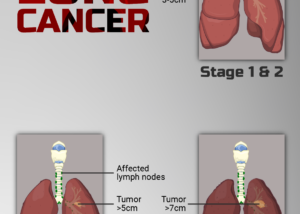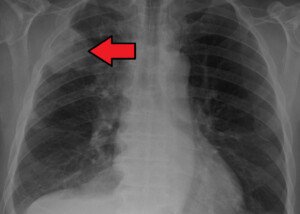Why is it that esophageal cancer can’t just be surgically removed in all cases, and instead, sometimes it’s left in there?
“It’s not a question of can but of should,” says Alex Little, MD, a thoracic surgeon with a special interest in esophageal and lung cancer.
“An esophagectomy (an operation to remove the esophagus) is a major operation with side effects, morbidity, and as many as 3% to 5% die in the postoperative time period.
“The only reason for performing it is the expectation of curing the cancer (with or without the addition of radiation or chemotherapy).
“That is why staging, determining the extent of cancer spread, is essential.
“This process includes multiple scans (CT, MRI and PET) to look for metastases to other organs or lymph nodes, and esophagoscopy to assess tumor extent and identify and biopsy nearby lymph nodes.
“If the conclusion is that there is no reasonable expectation that all cancer, including the primary tumor and possibly involved lymph nodes, can be removed, then an esophagectomy will not contribute to cure and should not be performed.
“There are alternative ways to palliate the patient’s quality of life including shrinking the cancer with radiation, reducing the impact of metastases with radiation and chemotherapy, and placing a stent in the esophagus to keep it open and restore the ability to swallow.”
That is a mighty bleak expectation for a tumor that has spread beyond its local confines.
We continue to live in an era in which aggressive preventative measures for this disease are crucial.
Lower the Risk for Esophageal Cancer
• Don’t smoke. Don’t even chew.
• Drink only lightly, if at all.
• Maintain a body weight that your doctor is happy with.
• Eat at least five servings daily of any combination of fruits and vegetables (raw).
• Limit processed foods.
• Get screened for Barrett’s esophagus if you’ve been dealing with acid reflux for years or have been diagnosed with GERD.
 Alex Little, MD, trained in general and thoracic surgery at the Johns Hopkins University School of Medicine; has been active in national thoracic surgical societies as a speaker and participant, and served as president of the American College of Chest Physicians. He’s the author of “Cracking Chests: How Thoracic Surgery Got from Rocks to Sticks,” available on Amazon.
Alex Little, MD, trained in general and thoracic surgery at the Johns Hopkins University School of Medicine; has been active in national thoracic surgical societies as a speaker and participant, and served as president of the American College of Chest Physicians. He’s the author of “Cracking Chests: How Thoracic Surgery Got from Rocks to Sticks,” available on Amazon.
 Lorra Garrick has been covering medical, fitness and cybersecurity topics for many years, having written thousands of articles for print magazines and websites, including as a ghostwriter. She’s also a former ACE-certified personal trainer.
Lorra Garrick has been covering medical, fitness and cybersecurity topics for many years, having written thousands of articles for print magazines and websites, including as a ghostwriter. She’s also a former ACE-certified personal trainer.
.










































